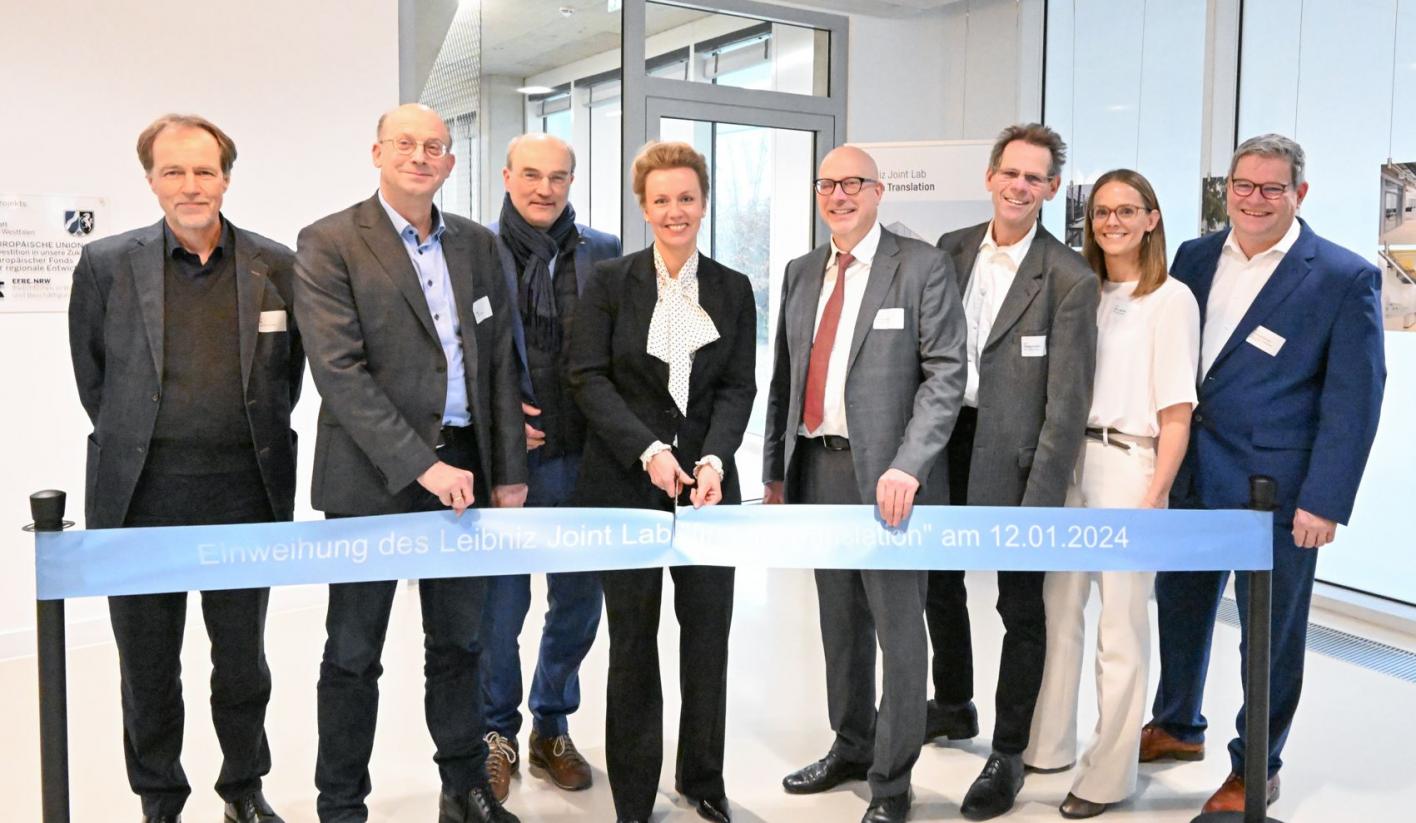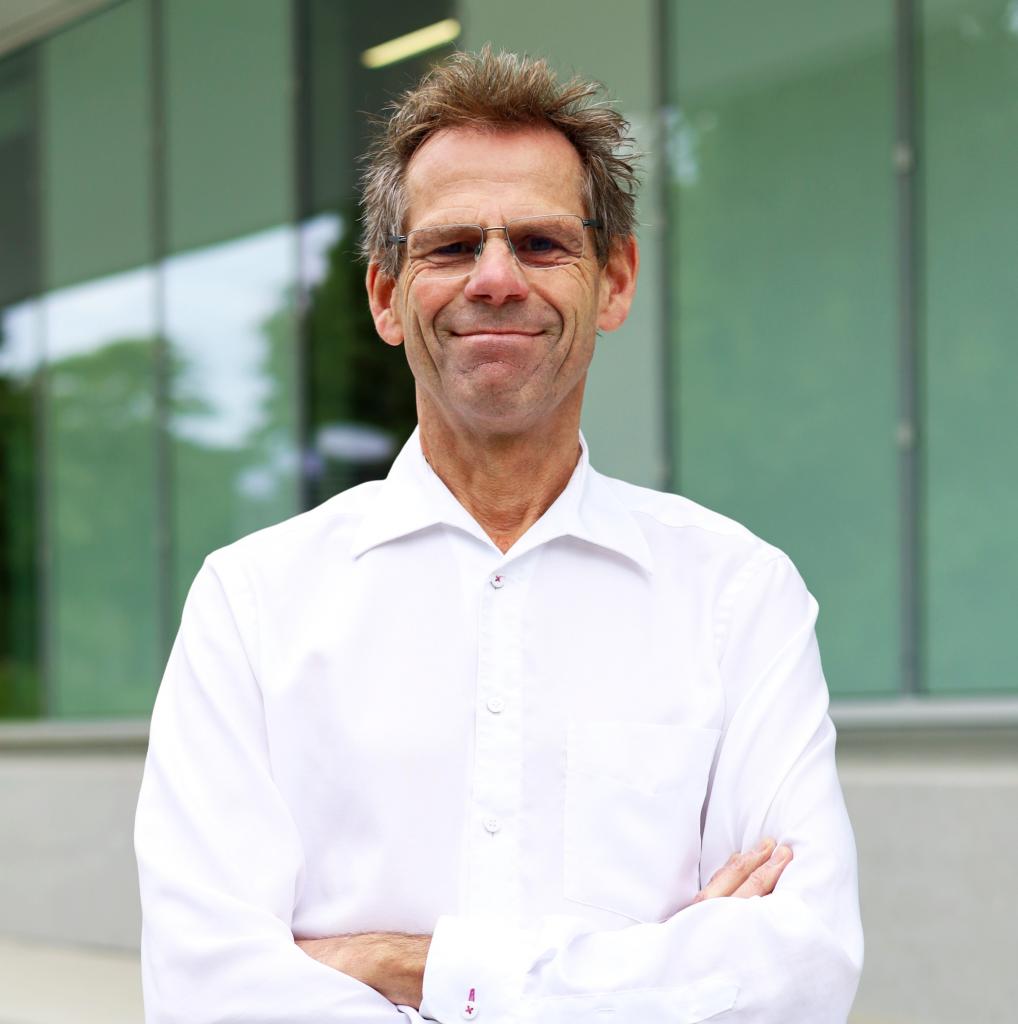Science Minister Ina Brandes officially opened the fiT
Patient-oriented research infrastructure for the therapies of tomorrow inaugurated
The DWI - Leibniz Institute for Interactive Materials (DWI) and the University Hospital RWTH Aachen officially inaugurated their new, jointly operated research infrastructure with a ceremony on January 12, 2024: the Leibniz Joint Lab "first in Translation" (fiT). Located close to the Biomedical Engineering Cluster on the Melaten Campus, this pioneering building in Aachen will make medical innovations available to patients more quickly in the future. Ina Brandes, Minister for Culture and Science of the state of North Rhine-Westphalia, and other guests from politics and science attended the event.
The Leibniz Joint Lab fiT consists of around 500 square meters of production space (laboratory space and clean rooms) as well as 600 square meters of training and office space. At the heart of the new building are the various clean rooms: "These special rooms enable the production of new medical developments with the high quality standards that are required for initial use in clinical trials. This enables us to guarantee the safety of these so-called clinical trial samples for the study subjects," explains Prof. Dr. Sven Stegemann, Managing Director of fiT. In future, the fiT's clean rooms will be able to produce the entire range of clinical test samples for medical technology and biomedical research. Production will be carried out in accordance with strict standards and guidelines. Researchers and users from materials science and medicine will have the opportunity to transfer the results of their joint research and materials development into clinical practice through the fiT.
Minister Ina Brandes: "New therapies are being researched, developed - and tested for the first time - in North Rhine-Westphalia. The jointly used research infrastructure of the Leibniz Institute for Interactive Materials and the University Hospital RWTH Aachen demonstrates in an outstanding way how the transfer of excellent scientific work into practical application can succeed. The Leibniz Joint Lab will make cutting-edge research 'made in NRW' accessible to people even faster. This will benefit all patients who are dependent on innovative cutting-edge medicine."
Prof. Dr. Andreas Herrmann, Interim Scientific Director of the DWI, emphasizes the strategic importance of the fiT for the Leibniz Institute in Aachen: "At the DWI, we combine the topics of humans, medicine and materials. The work of the fiT thus contributes in the long term to closing the gap between new developments from the laboratory and transfer to the patient's bedside." The initiators of the project recognized years ago that the further development of outstanding developments from basic research into an initial clinical trial would be a topic of the future for science. With the completed building at the Aachen site, researchers will now be able to fully exploit the potential of their innovative strength, says Herrmann.
Prof. Dr. Stefan Uhlig, Dean of the Faculty of Medicine at RWTH Aachen University, also emphasizes the importance of the new building for the further development of Aachen as a medical research location: "With the fiT building, RWTH Aachen University can significantly improve its possibilities as a translational hub for clinical studies in the field of medicine and technology." With the fiT, the DWI provides the infrastructure and know-how for project planning and the production of clinical trial samples, while the University Hospital RWTH Aachen provides its expertise in the planning and implementation of clinical trials in the fiT.
The total construction costs for the fiT amount to around 24 million euros. The project was financed by funding from the European Regional Development Fund (EFRE) and additional funds from the Federal Ministry of Education and Research (BMBF) and the Ministry of Culture and Science of the State of North Rhine-Westphalia (MKW NRW). The heinlewischer office was responsible for the designs and architectural planning. Construction and project management were in the hands of Schmitz.Reichard GmbH.
About the DWI - Leibniz Institute for Interactive Materials
The DWI - Leibniz-Institut für Interaktive Materialien e.V. (Leibniz Institute for Interactive Materials) is pursuing the goal of developing material functions previously only known from living matter. This concerns, for example, the ability to adapt material properties to changing external conditions, to change shape, to repair defects that occur and to control the interaction with living matter. These innovative materials should enable progress in areas such as medicine and diagnostics, as well as in the areas of mobility, the environment and sustainability, thus contributing to a better quality of life in the 21st century.
The DWI is a research institute of the Leibniz Association funded by the federal and state governments and based in Aachen. The institute was the first Aachen-based institute to be accepted into the Leibniz Association on January 1, 2014. It developed from the German Wool Research Institute, which was founded in 1952. Today, the DWI is an internationally visible and interdisciplinary research institute in the field of materials science with core competencies in chemistry, biotechnology and process engineering and employs around 150 people.
About RWTH Aachen University Hospital (AöR)
As a supramaximal care provider, RWTH Aachen University Hospital combines patient-oriented medicine and care, teaching and research at an international level. With 36 specialist clinics, 33 institutes and six interdisciplinary units, the University Hospital covers the entire medical spectrum. Highly qualified teams of doctors, nurses and scientists are committed to the health of patients. The bundling of patient care, research and teaching in one central building offers the best conditions for intensive interdisciplinary exchange and close clinical and scientific networking.
Around 9,000 employees provide patient-oriented medicine and care in accordance with recognized quality standards. With 1,400 beds, the university hospital treats around 50,000 inpatients and 200,000 outpatients per year.


